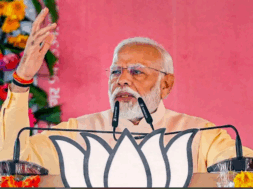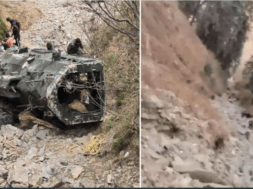
West Bengal Assembly Unanimously Passed Bill to Ensure Death Penalty for Rape and Murder
Manas Dasgupta
NEW DELHI, Sept 3: Amidst nation-wide outrage over the horrific rape and murder of a 31-year old trainee postgraduate doctor while on night duty at the RG Kar Medical College and Hospital in Kolkata on August 9, the West Bengal Assembly on Tuesday unanimously passed a bill seeking to provide for death penalty to the accused in case of murder followed by rape or put the victim in a vegetative state.
The bill named “Aparajita Bill” and titled “the Aparajita Women and Child (West Bengal Criminal Laws Amendment) Bill, 2024,” seeks to amend some provisions in the criminal code, Bharatiya Nyaya Sanhita, for the state making penalties for rape and child abuse more stringent.
The bill piloted by the state Law Minister Moloy Ghatak was passed by a voice vote at the two-day special session of the state Assembly convened only to adopt the stringent measures for crimes against women and children. The chief minister Mamata Banerjee, who intervened in the debate on the bill called the passage of the bill “historic.”
The opposition BJP welcomed the Bill despite stating that the Bharatiya Nyaya Sanhita (BNS) had all the provisions to deal with crime against women. Party leader and Leader of Opposition Suvendu Adhikari moved a motion seeking as many as seven amendments to the bill though none were accepted by the government.
The Bill seeks to punish “persons committing an offence of rape and inflicting injury which causes death or causes the woman to be in a vegetative state” with the death penalty. The bill was aimed at amending the existing provisions under the Bharatiya Nyaya Sanhita 2023, Bharatiya Nagarik Suraksha Sanhita, 2023, and the Protection of Children from Sexual Offences Act, 2012, “in their application to the state of West Bengal to enhance punishment and to constitute the framework for…expeditious investigation and trial of the heinous act of violence against women and children.”
The government has called a two-day special Assembly session from Monday in the wake of the rape of a trainee doctor that has caused anger and widespread protests in the country.
The Bill seeks to amend several sections in the newly-introduced Bharatiya Nyaya Sanhita. Section 64 in BNS lays down that a rape convict will face rigorous imprisonment not less than 10 years and this may extend to life term. The Bengal legislation tweaks this to enhance the jail term to the “remainder of that person’s natural life and fine, or with death.” It also adds that this fine shall be fair and reasonable to meet medical expenses and rehabilitation costs of the victim.
The Aparajita Bill also seeks to amend Section 66 of BNS, which lays down penalties for a convict if rape leads to the victim’s death or causes her to be in a “vegetative state”. While the Centre legislation lays down 20 years jail term, life imprisonment and death for such a crime, the Bengal Bill says the convict should get only death penalty.
Amending Section 70 of BNS, which deals with the penalty in gang rape cases, the Bengal legislation has done away with the option of a 20-year jail term and laid down provisions of life term and death for those convicted of gang rape.
The Bengal legislation also toughens the penalty in cases relating to publicising the identity of a victim of sexual violence. While the BNS has provision of jail term up to two years in such cases, Aparajita Bill provides for imprisonment between three and five years. The Bengal legislation also toughens the punishments in child abuse cases as laid down by the Protection of Children from Sexual Offences (POCSO) Act.
Besides toughening penalties, the Bengal legislation includes provisions for setting up special courts to hear sexual violence cases and task forces to investigate them. Additionally, it stipulates a life sentence without parole for those convicted of rape and gang rape.
The legislation moved by the ruling Trinamool Congress cleared the Bengal House comfortably with the support of both the ruling party and the Opposition, but it will need President Droupadi Murmu’s assent before it can come into force. Criminal Law comes in the concurrent list. This means that a law passed by a state Assembly can be implemented even if it is at odds with a law passed by Parliament, provided it has the President’s assent. But the President acts on the advice of ministers, and it is the Centre that will decide on whether this Bill becomes an Act. The Trinamool is a key rival of the BJP, which is in power at the Centre, and therefore, Aparajita Bill is unlikely to get a green signal.
Earlier, the Andhra Pradesh Assembly and the Maharashtra Assembly had passed Bills mandating death penalty in rape and gang rape cases. None of them have got Presidential assent so far. Ms Banerjee is well aware of the fact that the Aparajita Bill is unlikely to get the President’s go-ahead and its stringent provisions won’t see the light of the day. Why then did her party push it through the Assembly? The answer to this is in massive outrage against her government over the August 9 rape-murder incident.
Ms Banerjee is under fire from the Opposition and the civil society over the heinous crime at the state-run hospital. In an attempt to turn the tables on the main Opposition BJP, the Trinamool leadership has demanded a central law for death penalty in rape cases. This legislation appears to be another damage control exercise to manage the public perception and counter the criticism in the RG Kar rape-murder case, in which the BJP has accused her of shielding those responsible.
During the debate on the bill, Ms Banerjee asked BJP legislators to urge the Governor of the State to sign the Bill. “Rape is a curse against humanity and social reforms are required to prevent such crimes,” she said. “Once this Bill is passed, we will form a special Aparajita Task Force from among police to ensure time-bound completion of probe.” “It is a historic and model Bill, and any well-meaning person will support it,” said Ms Banerjee.
“I had told the family of the deceased that we will hand over the case to the CBI if the police was unable to crack it… Now, the case is with the CBI at the directions of the Calcutta High Court. Now, we want justice from CBI. The CBI should hang the culprits,” she said.
Leader of Opposition in the State Assembly Suvendu Adhikari extended full support to the bill, adding that Opposition BJP legislators want execution of the Bill immediately. Following Mr Adhikari’s speech, Opposition MLAs raised slogans and demanded Chief Minister Banerjee’s resignation over the rape and murder.
Ms Banerjee responded by demanding the resignation of Prime Minister Narendra Modi, Union Home Minister Amit Shah and the Chief Ministers of all States that have “not been able to implement effective legislations to safeguard women.” “What if I raise slogans against the Prime Minister and the Home Minister for the same reasons you are raising slogans against me?” she asked. States like Uttar Pradesh and Gujarat have abnormally high crime rates against women whereas in West Bengal, tortured women are getting justice in courts, she claimed.
The provisions of the draft Bill on the investigation and prosecution process stipulates that the probes into the rape cases shall be completed within 21 days of the initial report from the earlier two-month deadline.
“If it is not possible to complete the investigation within the period of 21 days from the date of information recorded by the officer-in-charge of the police station, then the said period can be further extended not exceeding 15 days by any police officer not below the rank of superintendent of police or equivalent, after recording the reasons in writing in the case diary maintained under Section 192 of the Bharatiya Nagarik Suraksha Sanhita, 2023,” the Bill states. It also seeks to penalise publishing without permission any matter related to court proceedings in rape cases. If a person discloses the identity of the victim of “certain cases,” he/she will be imprisoned for three to five years and a fine will be imposed.
The Bill also seeks to set up fast-track courts for rape cases. “To expedite investigations and ensure swift justice for victims, this Bill proposes dedicated special courts and investigation teams. These specialised units will be equipped with the necessary resources and expertise to handle cases of rape of women and sexual offences against children efficiently, effectively and timely, thereby minimising the trauma experienced by victims and their families.”
‘Aparajita Task Force’ will be constituted to investigate cases of rape or atrocities on women and children. The task force will be formed at the district level and headed by a deputy superintendent of police for the investigation.
Under the statement of objects and reasons, it has been mentioned that the Bill was aimed at creating a “safer environment for women and children in the State of West Bengal by amending and proposing new provisions related to the offence of rape and sexual offences against children.”
As far the investigation by the CBI in the RG Kar Medical College rape and murder case, the central agency on Monday had arrested the former principal of the college Sandip Ghosh for his alleged involvement in financial misconduct at the establishment and on Tuesday picked up his security guard (Afsar Ali Khan) and two vendors (Biplav Singha and Sumon Hazra) who used to supply materials to the hospital.













